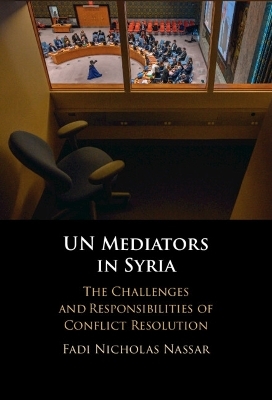
UN Mediators in Syria
The Challenges and Responsibilities of Conflict Resolution
Seiten
2024
Cambridge University Press (Verlag)
978-1-009-41383-1 (ISBN)
Cambridge University Press (Verlag)
978-1-009-41383-1 (ISBN)
By highlighting the role of UN mediators in conflicts like Syria, this book examines what those tasked with the responsibility to make peace actually do. In addition to appealing to readers interested in diplomacy, decision-making and conflict resolution, its analysis of Syria also engages Middle East politics and history readers.
Since 2011, the conflict in Syria has been one of the most catastrophic conflicts of our time and a dark stain on the peacemaking abilities of the United Nations (UN). At the heart of this book is a simple but critical question – what do UN mediators tasked with the responsibility to make peace actually do? By explaining this, the book offers a detailed record of what Kofi Annan, Lakhdar Brahimi, and Staffan de Mistura did in their roles as UN mediators in Syria and presents a comprehensive analysis of the dynamics that shaped their decision-making. Beyond the cases of these three mediators, Fadi Nicholas Nassar introduces a method by which to forensically identify a mediator's fingerprints on the peacemaking process and charts a map to examine their decision-making processes. In doing so, it paves the way to evaluate the performance of these mediators – to hold them accountable for their successes and failures.
Since 2011, the conflict in Syria has been one of the most catastrophic conflicts of our time and a dark stain on the peacemaking abilities of the United Nations (UN). At the heart of this book is a simple but critical question – what do UN mediators tasked with the responsibility to make peace actually do? By explaining this, the book offers a detailed record of what Kofi Annan, Lakhdar Brahimi, and Staffan de Mistura did in their roles as UN mediators in Syria and presents a comprehensive analysis of the dynamics that shaped their decision-making. Beyond the cases of these three mediators, Fadi Nicholas Nassar introduces a method by which to forensically identify a mediator's fingerprints on the peacemaking process and charts a map to examine their decision-making processes. In doing so, it paves the way to evaluate the performance of these mediators – to hold them accountable for their successes and failures.
Fadi Nicholas Nassar is Director of the Institute for Social Justice and Conflict Resolution and Assistant Professor of Political Science and International Affairs at the Lebanese American University (LAU). He is also the US–Lebanon Fellow at the Middle East Institute; Fellow at The Sectarianism, Proxies and De-sectarianisation (SEPAD) project based at Lancaster University's Richardson Institute; and Research Fellow at the Lebanese Center for Policy Studies (LCPS). He holds a PhD from the War Studies Department at King's College London.
1. Introduction: Dispelling the Fog of Peace-making; 2. The Global Statesman; 3. The Quiet Negotiator; 4. The Televised Humanitarian; Conclusion: The Fingerprints They Leave Behind; References; Index.
| Erscheinungsdatum | 14.05.2024 |
|---|---|
| Zusatzinfo | Worked examples or Exercises |
| Verlagsort | Cambridge |
| Sprache | englisch |
| Maße | 158 x 235 mm |
| Gewicht | 640 g |
| Themenwelt | Geisteswissenschaften ► Geschichte ► Regional- / Ländergeschichte |
| Sozialwissenschaften ► Politik / Verwaltung ► Europäische / Internationale Politik | |
| Sozialwissenschaften ► Politik / Verwaltung ► Staat / Verwaltung | |
| ISBN-10 | 1-009-41383-X / 100941383X |
| ISBN-13 | 978-1-009-41383-1 / 9781009413831 |
| Zustand | Neuware |
| Haben Sie eine Frage zum Produkt? |
Mehr entdecken
aus dem Bereich
aus dem Bereich
Erinnerungen
Buch | Softcover (2024)
Pantheon (Verlag)
16,00 €
Universalgelehrter, Polarreisender, Entdecker
Buch | Hardcover (2024)
mareverlag
28,00 €


